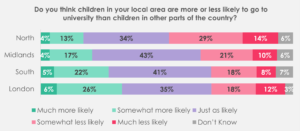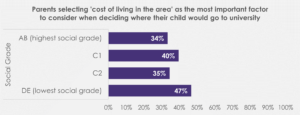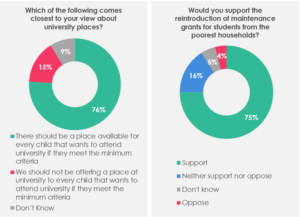New poll reveals parents from low socioeconomic backgrounds consider the cost of living in an area to be more important than university reputation or field of study, when deciding where their child will go to university.
The Brilliant Club commissioned Public First to poll parents’ attitudes towards university to better understand the challenges that parents are facing across the UK. The result is a rare insight into how higher education is perceived across the UK.
Methodology
The survey polled 1,005 parents of children in state schools in England between September 7th and 15th 2023.[i] The purpose of the survey was to understand parents’ attitudes towards higher education (HE) and their views on key policy issues related to university access. There were five key findings from the survey that highlighted the need for policy action and better community support, especially in the North of England.
Finding 1. Pessimism about future access to university: 41% of surveyed parents believed that it will be more difficult for their child’s generation to attend university than their own.

Finding 2. Needing help to support their children: 71% of parents said they would need help in supporting their child if they wanted to apply to university.

Finding 3. Regional disparities: Parents in the North are the most pessimistic about the chances of children in their local area attending university compared to children in the rest of the country.

Finding 4. Cost of living influencing university choice: 47% of parents in the lowest social grade (DE) thought the most important factor in deciding where their child would go to university is the cost of living in the area, above university reputation and field of study.

Finding 5. All children should be able to go to university and the government should be supporting them financially: 76% of parents believe that there should be a university place available for students who meet the minimum criteria and 75% of parents want to help the least-advantaged students when they get to university through the reintroduction of maintenance grants.

CEO of The Brilliant Club, Anne-Marie Canning, said:
“This is a unique and timely opportunity to understand how parents and carers across the UK perceive higher education and the routes available for their children. There is a need to better support parents with advice and guidance, so that the life-changing world of university becomes accessible for anyone who wants to go.”
Meg Price, Senior Policy Manager at Public First, said:
“Parents play a key – but often overlooked – role when it comes to higher education policy. Our poll shows clearly that a university degree is still a highly valued route for young people in England. Policymakers and universities allow places for home students to be restricted at their peril.”
The Brilliant Club believes that parent and carer voices matter and runs its Parent Power programme across the UK, each one supported by an anchor institution. Through advice and guidance on accessing higher education, and developing skills in community organising, Parent Power empowers parents and carers to make change in their children’s future. Parent leader Rahiela Koser of Oldham Parent Power said:
“It’s great to be part of a group that addresses these issues and doesn’t wait around for others to come in and create change – we’re actually driving that change. We’re having those difficult conversations about the low uptake of higher education here in Oldham and what we as parents can do to change that and break down barriers to allow for more children, and their parents, to access higher education.”
You can read more about our Parent Power chapters here.
The Brilliant Club is holding a panel on the future of HE policy at the Labour Party Conference, with support from the Tony Blair Institute. The findings of the polling will be discussed during this event. For further information about the event, including how to register, click here.
The Brilliant Club is holding a panel at the Labour Party Conference on Parent Power: What do Parents and carers want to see in education? For further information about the event, including how to register, click here.
[i] After weighting for the sample to be nationally representative of English parents, respondents were: 50% male, 56% with A-levels as their highest level of educational attainment, and 20% in the lowest social grade.